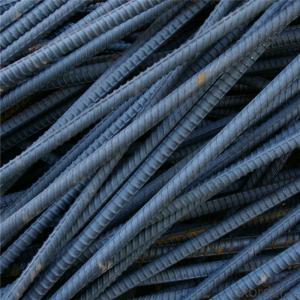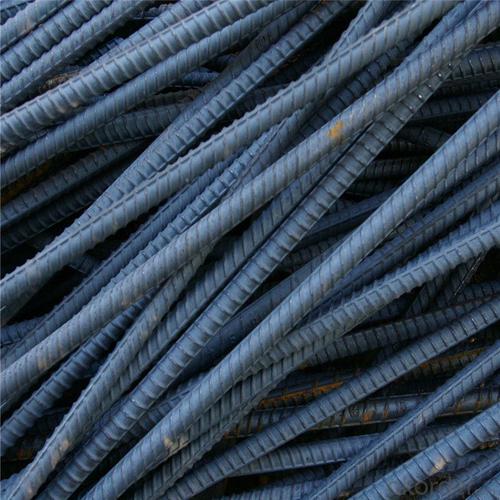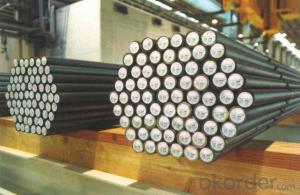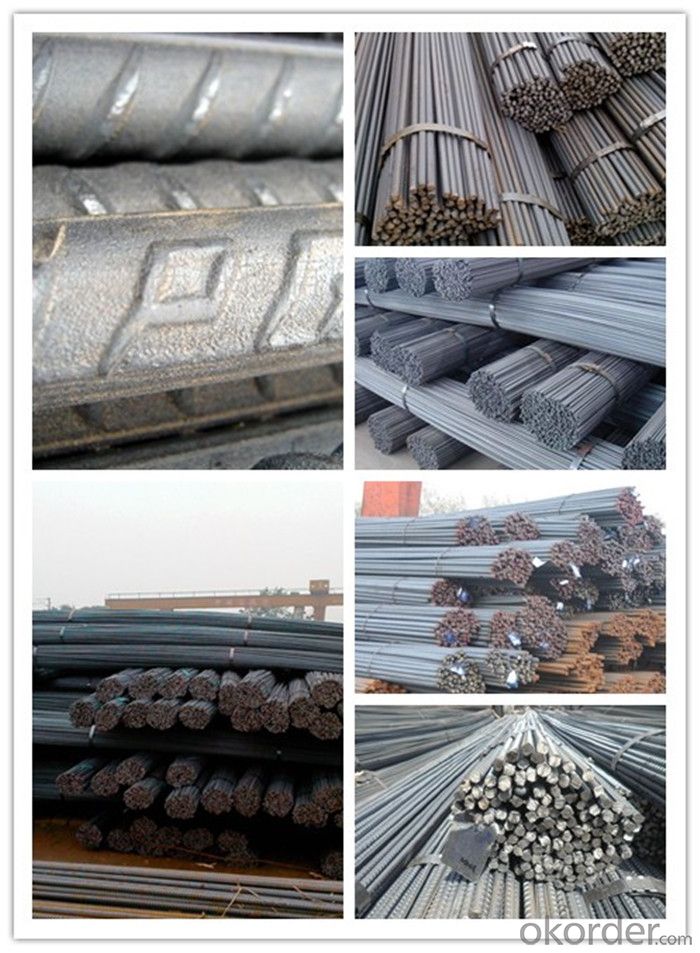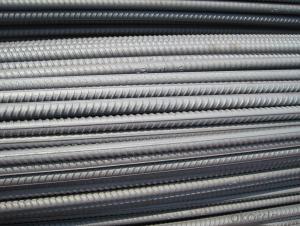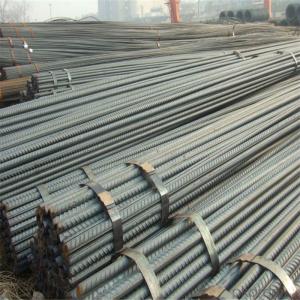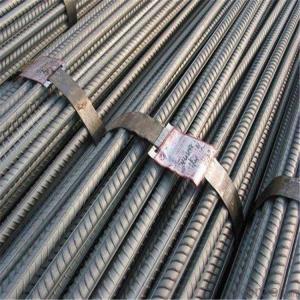Bs4449 Deformed Steel Bar with All Sizes
- Loading Port:
- Tianjin
- Payment Terms:
- TT OR LC
- Min Order Qty:
- 25 m.t.
- Supply Capability:
- 50000 m.t./month
OKorder Service Pledge
OKorder Financial Service
You Might Also Like
Specification
Bs4449 Deformed Steel Bar with All Sizes
Description of Bs4449 Deformed Steel Bar:
1, Diameter: 5.5mm-10mm rounds reinforcing steel bar
10m- 40 rods reinforcing Bs4449 Deformed Steel Bar
2, Length: 6m, 9m, 12m or customized
3, Standard: GB, ASTM, AISI, SAE, DIN, JIS, EN
OEM technology - send detailed technical parameters for accurate quotation.
2, Produce Process: smelt iron - EAF smelt billet - ESR smelt billet -
hot rolled or forged to get the steel round bar and plate
3, Heat Treatment: annealing, normalizing, tempering, quenching
4, Surface Treatment: Black
5, Quality Assurance: We accept third party inspection for all orders.
You can ask testing organizations such as SGS, BV, etc. to test our products before shipping.
Chemical Composition of Bs4449 Deformed Steel Bar:
Grade | Technical data of the original chemical composition(%) | |||||
Reinforcing steel bar HRB335 | C | Mn | Si | S | P | B |
≤0.25 | ≤1.60 | ≤0.80 | ≤0.045 | ≤0.045 | >0.0008 | |
Physics Capability | ||||||
Yield Strength(N/cm2) | Tensile Strength(N/cm2) | Elongation(%) | ||||
≥ 335 | ≥490 | ≥16 | ||||
Reinforcing steel bar HRB400 | C | Mn | Si | S | P | B |
≤0.25 | ≤0.16 | ≤0.80 | ≤0.045 | ≤0.045 | 0.04-0.12 | |
Physics Capability | ||||||
Yield Strength(N/cm2) | Tensile Strength(N/cm2) | Elongation(%) | ||||
≥ 400 | ≥ 570 | ≥ 14 | ||||
Product Show of Bs4449 Deformed Steel Bar:
Company Information:
CNBM International Corporation is the most important trading platform of CNBM group.
Whith its advantages, CNBM International are mainly concentrate on Cement, Glass, Iron and Steel, Ceramics industries and devotes herself for supplying high qulity series of refractories as well as technical consultancies and logistics solutions.

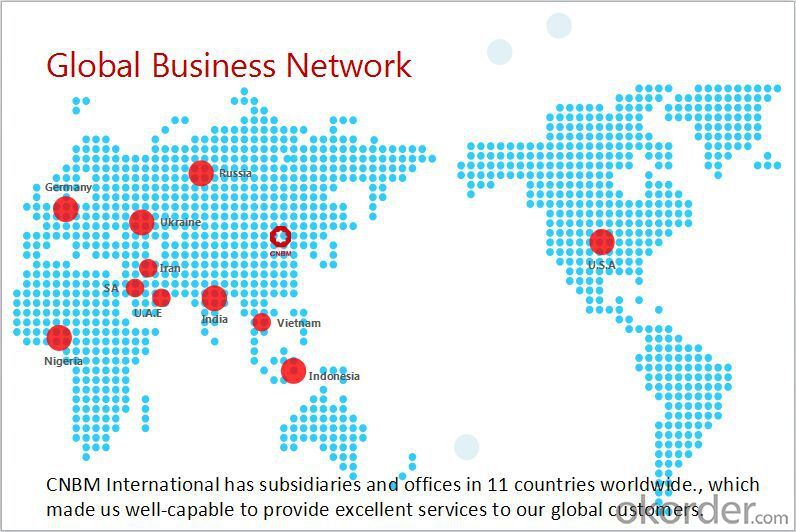
FAQ:
1, Your advantages?
professional products inquiry, products knowledge train (for agents), smooth goods delivery, excellent customer solution proposale
2, Test & Certificate?
SGS test is available, customer inspection before shipping is welcome, third party inspection is no problem
3, Factory or Trading Company?
CNBM is a trading company but we have so many protocol factories and CNBM works as a trading department of these factories. Also CNBM is the holding company of many factories.
4, Payment Terms?
30% TT as deposit and 70% before delivery.
Irrevocable L/C at sight.
5, Trading Terms?
EXW, FOB, CIF, FFR, CNF
6, After-sale Service?
CNBM provides the services and support you need for every step of our cooperation. We're the business partner you can trust.
For any problem, please kindly contact us at any your convenient time.
We'll reply you in our first priority within 24 hours.
- Q: Can special steel be cast?
- Yes, special steel can be cast.
- Q: How is special steel used in the aerospace industry?
- Special steel is used in the aerospace industry for various applications due to its exceptional strength, durability, and resistance to extreme temperatures. It is commonly utilized in the manufacturing of aircraft structures, engine components, landing gear, and fasteners. The high strength-to-weight ratio of special steel enables the construction of lightweight yet robust parts, contributing to improved fuel efficiency and aircraft performance. Additionally, its ability to withstand harsh environmental conditions and maintain structural integrity makes it indispensable for ensuring the safety and reliability of aerospace systems.
- Q: How is special steel used in the production of aircraft landing gear?
- Special steel is used in the production of aircraft landing gear due to its high strength, durability, and resistance to fatigue. It helps ensure the landing gear can withstand the stress and impact forces experienced during takeoff, landing, and taxiing. Additionally, special steel alloys are used to create components with precise dimensions and superior corrosion resistance, ensuring the landing gear performs reliably in various environmental conditions.
- Q: How does special steel ensure dimensional stability?
- Dimensional stability is guaranteed by special steel through a variety of mechanisms. To begin with, special steel possesses exceptional strength and toughness, enabling it to withstand external forces and prevent deformation. This characteristic is of utmost importance in applications where precise dimensional accuracy is critical, such as in precision machinery or tooling. Moreover, special steel is subjected to specific heat treatment processes to enhance its dimensional stability. For instance, the common practices of quenching and tempering are employed to augment the steel's hardness and resistance to wear, while simultaneously minimizing the risk of warping or distortion. These treatments also aid in preserving the steel's shape and size over time, even in the face of fluctuating temperature conditions. Additionally, special steel often incorporates alloying elements like chromium, nickel, or molybdenum, which contribute to its corrosion resistance. By preventing oxidation and rusting, these alloying elements assist in maintaining the steel's dimensional stability by averting any deterioration or loss of material due to corrosion. Furthermore, the manufacturing process of special steel adheres to rigorous quality control measures to ensure consistent dimensional accuracy. This encompasses meticulous control of the composition, refining techniques, and casting or forging processes. By maintaining precise tolerances during production, special steel can achieve the requisite dimensional stability demanded by specific applications. In conclusion, special steel secures dimensional stability through its exceptional strength, heat treatment processes, inclusion of alloying elements for corrosion resistance, and stringent quality control during manufacturing. These factors collectively contribute to the preservation of the steel's shape, size, and precision over time.
- Q: How does special steel resist oxidation?
- The outstanding resistance to oxidation exhibited by special steel is well-known. This is mainly attributed to the inclusion of elements like chromium, nickel, and manganese in its composition. These elements combine to create a passive film, known as a protective layer, on the steel's surface. This film effectively shields the steel from oxygen and moisture. Chromium is the principal element responsible for the oxidation resistance of special steel. It undergoes a reaction with atmospheric oxygen, resulting in the formation of a thin layer of chromium oxide on the steel's surface. This oxide layer is exceptionally stable and prevents any further oxidation of the underlying metal. It acts as a protective shield, hindering the penetration of oxygen and moisture into the steel, which could otherwise lead to corrosion or rusting. Moreover, nickel and manganese also contribute to the oxidation resistance of special steel. They assist in stabilizing the passive film created by chromium oxide and enhance its protective properties. These elements also bolster the steel's ability to withstand high temperatures and corrosive environments. Furthermore, the composition and processing techniques employed in the production of special steel play a vital role in its oxidation resistance. The steel is often subjected to heat treatment processes, such as annealing or quenching, which further enhance its resistance to corrosion. Through meticulous control of alloying elements and precise heat treatment procedures, a robust and long-lasting passive film is formed. In conclusion, special steel's ability to resist oxidation is primarily due to the presence of chromium, nickel, and manganese, which collaborate to create a protective layer on its surface. This passive film acts as a barrier against oxygen and moisture, effectively preventing corrosion and rusting. Additionally, the composition and processing techniques utilized during production significantly contribute to the exceptional oxidation resistance of special steel.
- Q: How does special steel contribute to the manufacturing of gears?
- Due to its unique properties and characteristics, special steel is essential in the production of gears. Gears, which are mechanical devices that facilitate the transmission of power and motion between rotating shafts, require the ability to withstand high loads, operate at high speeds, and maintain precise dimensions for smooth and efficient performance. Special steel, with its enhanced mechanical properties and superior quality, provides the necessary strength, durability, and wear resistance needed for gear manufacturing. A key aspect of special steel is its high strength and hardness. Gears often endure heavy loads and experience significant stress during operation. Special steel, such as alloy steel or tool steel, possesses exceptional strength, enabling gears to handle these loads without deformation or failure. Additionally, the hardness of special steel ensures that gears can withstand abrasive wear and prevent damage caused by external factors like friction and contact with other components. Special steel also contributes to gear manufacturing by offering excellent fatigue resistance. Gears are exposed to repetitive cyclic loading, which, if not properly designed and manufactured, can result in fatigue failure over time. Special steel, with its unique microstructure and composition, enhances the fatigue life of gears by minimizing crack propagation and reducing the risk of failure, ensuring long-term reliability and performance. Furthermore, special steel provides excellent machinability and dimensional stability, two critical factors in gear manufacturing. The machinability of special steel allows for precise shaping and cutting of gear teeth, ensuring accurate dimensions and smooth gear operation. The dimensional stability of special steel helps to maintain the gear's shape and integrity under various temperature and environmental conditions, guaranteeing consistent performance throughout its lifespan. In conclusion, special steel plays a significant role in gear manufacturing by supplying the necessary strength, durability, wear resistance, fatigue resistance, machinability, and dimensional stability. Gears made from special steel can endure high loads, operate at high speeds, and maintain precise dimensions, ultimately contributing to the efficient functioning of various machinery and mechanical systems.
- Q: Can special steel be used for making chemical processing equipment?
- Indeed, chemical processing equipment can indeed be manufactured using special steel. It is common practice to opt for special steels, such as stainless steel, for such purposes due to their remarkable ability to resist corrosion, endure high temperatures, and exhibit durability. Given that chemical processing equipment frequently encounters corrosive substances, operates under extreme temperatures and pressures, it becomes imperative to employ materials that can withstand these demanding conditions. Special steel alloys are specifically engineered to possess exceptional resistance to corrosion, including resistance to acids, alkalis, and other aggressive chemicals. Furthermore, these steels are able to maintain their mechanical properties even when subjected to elevated temperatures, thereby ensuring the equipment's integrity and safety. Consequently, special steel emerges as an appropriate choice for the production of chemical processing equipment.
- Q: How does special steel perform in cryogenic toughness?
- Special steel is known for its exceptional performance in cryogenic toughness. When exposed to extremely low temperatures, such as those found in cryogenic applications, the toughness of regular steel decreases significantly. However, special steel is specifically designed to withstand such extreme conditions and maintain its toughness and ductility. The properties of special steel, such as its composition and microstructure, are carefully engineered to ensure its high performance in cryogenic environments. With a unique combination of alloying elements and heat treatment processes, special steel can resist brittle fracture and maintain its strength even at temperatures as low as -196 degrees Celsius (-321 degrees Fahrenheit). The excellent cryogenic toughness of special steel makes it an ideal choice for various applications, including liquefied natural gas (LNG) storage and transportation, aerospace engineering, and medical equipment used in cryogenic medicine. It provides the necessary reliability and safety when subjected to extreme cold temperatures, ensuring the integrity and functionality of the materials and structures it is used in. Overall, special steel's exceptional performance in cryogenic toughness sets it apart from regular steel and makes it a preferred choice for applications that require reliable and durable materials in extremely low-temperature environments.
- Q: How does special steel contribute to reducing energy consumption?
- Special steel can contribute to reducing energy consumption in several ways. Firstly, special steel is often used in the manufacturing of more efficient and lightweight components, such as in the automotive and aerospace industries. These components help to reduce the overall weight of vehicles and aircraft, resulting in lower energy requirements for propulsion. Additionally, special steel can be utilized in the construction of energy-efficient buildings and infrastructure. Its high strength and durability allow for the creation of lighter and thinner structural elements, which can reduce the amount of steel required and the energy needed for construction. Furthermore, special steel alloys can have improved heat transfer properties, making them ideal for the production of energy-efficient appliances and equipment. By enhancing the thermal conductivity, special steel facilitates faster heating or cooling processes, reducing energy consumption in various applications like refrigerators, air conditioners, and industrial machinery. In summary, special steel's contribution to reducing energy consumption lies in its ability to enable lightweight designs, construct energy-efficient buildings, and enhance heat transfer efficiency in appliances and equipment.
- Q: What are the safety considerations when working with special steel?
- When working with special steel, some important safety considerations include wearing appropriate personal protective equipment such as gloves, safety glasses, and steel-toed boots to protect against potential hazards. It is crucial to handle the steel carefully to avoid injuries like cuts, punctures, or strains. Additionally, workers should be cautious of the high temperatures that may be involved during the manufacturing or shaping process and take necessary precautions to prevent burns. Proper training and knowledge of the specific properties and handling techniques of the special steel being used are also essential for ensuring a safe working environment.
Send your message to us
Bs4449 Deformed Steel Bar with All Sizes
- Loading Port:
- Tianjin
- Payment Terms:
- TT OR LC
- Min Order Qty:
- 25 m.t.
- Supply Capability:
- 50000 m.t./month
OKorder Service Pledge
OKorder Financial Service
Similar products
Hot products
Hot Searches
Related keywords
